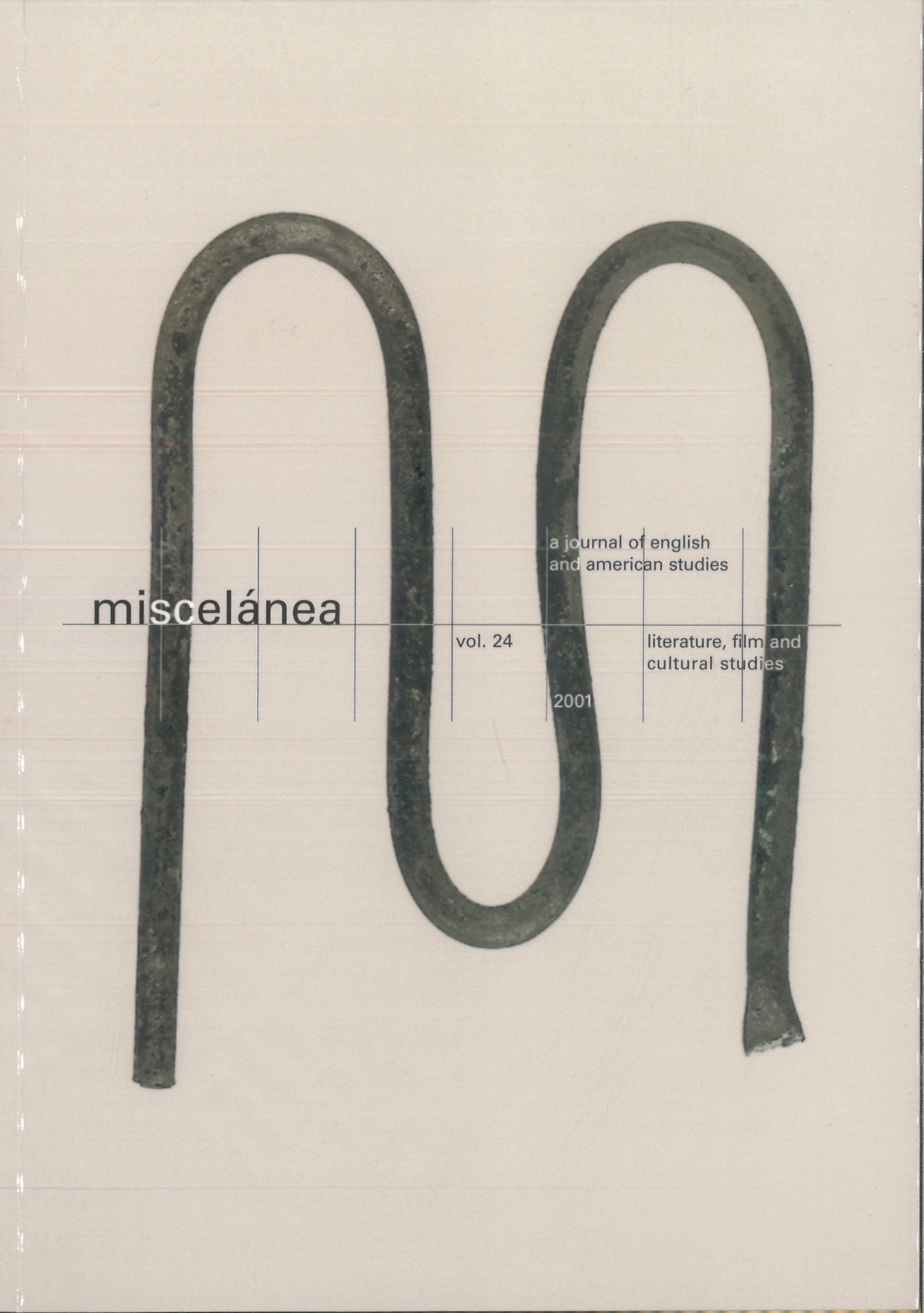"Selves into Relation": Virginia Wolf and the Conversational Essay
DOI:
https://doi.org/10.26754/ojs_misc/mj.200110266Palabras clave:
Virginia Woolf, Ginocrítica, Ensayo, Diálogo, ConversaciónResumen
Aunque más conocida como novelista, Virginia Woolf comenzó su vida profesional como mujer crítica: como mujer, se esforzó por superar las sospechas iniciales que su sexo, juventud e inexperiencia podían despertar en el mundo de la edición y la publicación; como crítica, se encontró con la oposición de sus contemporáneos masculinos por subvertir en sus ensayos valores críticos establecidos que Woolf no deseaba perpetuar. Dentro de la obra crítica de Woolf destacan sus "ensayos conversacionales", una forma literaria que hace hincapié en la espontaneidad del discurso oral, así como en la pluralidad dialógica, y que se remonta a una larga tradición desde Platón hasta William Hazlitt, Michel de Montaigne y Oscar Wilde. El uso de la conversación, en sí misma un híbrido a caballo entre el discurso escrito y el oral, permite que emerjan las voces de los forasteros y los intrusos: Woolf propuso el ensayo conversacional como contrapunto a lo que definió como el "enorme logro masculino". Es a partir de este proceso de intercambio y colisión como estalla la verdad, se desarrolla el conocimiento y se superan finalmente la inclusión y la insularidad.
Descargas
Referencias
ADORNO, Theodor. 1984. “The Essay as Form”, Trans. Bob Hullot-Kentor. New German Critique 3: 151-171.
BAKHTIN, Mikhail. 1981. The Dialogic Imagination: Four Essays. Ed. Michael Holquist. Trans. Caryl Emerson and Michael Holquist. Austin: University of Texas Press.
—. 1984. Problems of Dostoevsky’s Poetics. Ed. and trans. Caryl Emerson. Minneapolis: University of Minnesota Press.
—. 1986. Speech Genres and Other Late Essays. Trans. Vern W. McGee. Eds. Caryl Emerson and Michael Holquist. Austin: University of Texas Press.
BEER, Gillian. 1996. Virginia Woolf: The Common Ground. Edinburgh: Edinburgh U. P.
BROSNAN, Leila. 1997. Reading Virginia Woolf's Essays and Journalism: Breaking the Surface of Silence. Edinburgh: Edinburgh U. P.
DICK, Susan. 1983. ““What Fools We Were!’: Virginia Woolf's ‘A Society’’. Twentieth-Century Literature 25: 51-66.
DUSINBERRE, Juliet. 1997. Virginia Woolf's Renaissance: Woman Reader or Common Reader? London: McMillan.
ELLIOT, T. S. 1932. Selected Essays. London: Faber and Faber.
FERNALD, Anne E. 1991. “A Room of One's Own, Personal Criticism and the Essay”. Twentieth-Century Literature 40: 165-189.
—-. 1997. “Pleasure and Belief in ‘Phases of Fiction’”. In Rosenberg, Carole and Jeanne Dubino. (eds.). Virginia Woolf and the Essay. New York: St Martin’s: 193-215.
FISHER, Elizabeth Jane. 1990. “The Seduction of the Father: Virginia Woolf and Leslie Stephen”. Women’s Studies 18: 31-40.
FOUCAULT, Michel 1970. The Order of Things: An Archaeology of the Human Sciences. New York: Vintage.
GADAMER, Hans Georg. 1975. Truth and Method. New York: Continuum.
GILLESPIE, Diane Filby. 1988. The Sisters’ Art: The Writing and Painting of Virginia Woolf and Vanessa Bell. New York: Syracuse U. P.
GREENE, Sally. (ed.). 1999. Virginia Woolf: Reading the Renaissance. Ohio: Ohio U. P.
HUNGERFORD, Edward A. 1983: “Is ‘A Society’ a Short Story?”. Virginia Woolf's Miscellany 21: 3.
HYMAN, Virginia. 1983. “Reflections in the Looking-Glass: Leslie Stephen and Virginia Woolf”. Journal of Modern Literature 10: 197-216.
LE GUERN, M. 1981. “Sur le genre du dialogue”. L’automne de la Renaissance 1580-1630. Paris: Vrin: 141-148.
LUKÁCS, Georg. 1974. “On the Nature and Form of the Essay”. Soul and Form. Trans. Anna Bostock. Cambridge, Massachusetts: MIT Press: 1-18.
ROSENBERG, Beth Carole and Jeanne Dubino. (eds.) 1997. Virginia Woolf and the Essay. New York: St Martin’s,
VIAN HERRERO, Ana. 1988. “La ficción conversacional en el diálogo renacentista”. Edad de oro 7: 173-186.
WOOLF, Virginia. 1929-1945. A Room of One’s Own. Harmondsworth: Penguin.
—. 1950. The Captain's Death Bed and other Essays. Ed. Leonard Woolf. London: The Hogarth Press.
—. 1966. The Collected Essays of Virginia Woolf fl. Ed. Leonard Woolf. London: The Hogarth Press.
—. 1978. The Diary of Virginia Woolf Il. Ed. Anne Olivier Bell. Harmondsworth: Penguin.
—. 1979. “‘Anon’ and ‘The Reader’: Virginia Woolf’s Last Essays”. Ed. Brenda Silver. Twentieth-Century Literature 25: 356-441,
—. 1985. The Complete Shorter Fiction of Virginia Woolf. Ed. Susan Dick. London: The Hogarth Press,
—. 1986. The Essays of Virginia Woolf. Ed. Andrew McNeillie. London: The Hogarth Press.
—. 1987. The Essays of Virginia Woolf Il. Ed. Andrew McNeillie. London: The Hogarth Press.
—. 1988. The Essays of Virginia Woolf Ill. Ed. Andrew MeNeillie. London: The Hogarth Press.
—. 1990. A Passionate Apprentice: The Early Journals of Virginia Woolf 1897-1909. Ed Mitchell Leaska. London: The Hogarth Press.
—. 1992. The Selected Essays of Virginia Woolf Il, Ed. Rachel Bowlby: Harmondsworth: Penguin.
—.1994a. The Essays of Virginia Woolf IV. Ed. Andrew McNeillie. London: The Hogarth Press.
—. 1994b. The Letters of Virginia Woolf V. Ed. Nigel Nicolson. London: The Hogarth Press.
Descargas
Publicado
Número
Sección
Licencia

Esta obra está bajo una licencia internacional Creative Commons Atribución-NoComercial 4.0.


